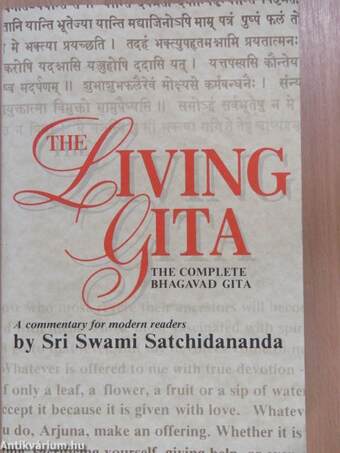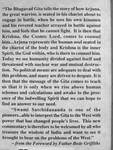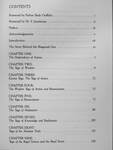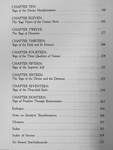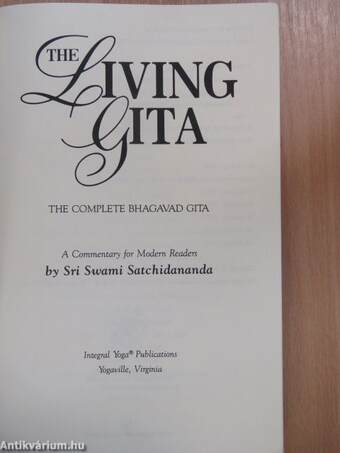1.067.715
kiadvánnyal nyújtjuk Magyarország legnagyobb antikvár könyv-kínálatát

VISSZA
A TETEJÉRE
JAVASLATOKÉszre-
vételek
The Living Gita
The Complete Bhagavad Gita
| Kiadó: | Integral Yoga Publications |
|---|---|
| Kiadás helye: | Yogaville |
| Kiadás éve: | |
| Kötés típusa: | Ragasztott papírkötés |
| Oldalszám: | 325 oldal |
| Sorozatcím: | |
| Kötetszám: | |
| Nyelv: | Angol |
| Méret: | 23 cm x 15 cm |
| ISBN: | 978-0-932040-27-5 |
naponta értesítjük a beérkező friss
kiadványokról
naponta értesítjük a beérkező friss
kiadványokról
Fülszöveg
"The Bhagavad Gita tells the story of how Arjuna,
the great warrior, is seated in his chariot about to
engage in battle, when he sees his own kinsmen
and his revered teacher arrayed in battle against
him, and feels that he cannot fight. It is then that
Krishna, the Cosmic Lord, comes to counsel
him Arjuna represents the human soul seated in
the chariot of the body and Krishna is the inner
Spirit, the God within, who is there to counsel him.
Today we see humanity divided against itself and
threatened with nuclear war and mutual destruc-
tion. No political means are adequate to deal with
this problem, and many are driven to despair. It is
then that the message of the Gita comes to teach
us that it is only when we rise above human
schemes and calculations and awake to the pres-
ence of the indwelling Spirit that we can hope to
find an answer to our need.
"Swami Satchidananda is one of the
pioneers able to interpret the Gita to the West with
power that has changed... Tovább
Fülszöveg
"The Bhagavad Gita tells the story of how Arjuna,
the great warrior, is seated in his chariot about to
engage in battle, when he sees his own kinsmen
and his revered teacher arrayed in battle against
him, and feels that he cannot fight. It is then that
Krishna, the Cosmic Lord, comes to counsel
him Arjuna represents the human soul seated in
the chariot of the body and Krishna is the inner
Spirit, the God within, who is there to counsel him.
Today we see humanity divided against itself and
threatened with nuclear war and mutual destruc-
tion. No political means are adequate to deal with
this problem, and many are driven to despair. It is
then that the message of the Gita comes to teach
us that it is only when we rise above human
schemes and calculations and awake to the pres-
ence of the indwelling Spirit that we can hope to
find an answer to our need.
"Swami Satchidananda is one of the
pioneers able to interpret the Gita to the West with
power that has changed people's lives. This new
commentary is therefore to be welcomed by all who
treasure the wisdom of India and want to see it
brought to bear on the problems of the West."
- from the Foreword by Father Bede Griffiths Vissza
Témakörök
- Idegennyelv > Idegennyelvű könyvek > Angol > Vallás > Vallásos irodalom
- Szépirodalom > Versek, eposzok > A szerző származása szerint > Ázsia > India
- Vallás > Vallásos irodalom > Egyéb
- Idegennyelv > Idegennyelvű könyvek > Angol > Szépirodalom > Versek, eposzok > Egyéb
- Idegennyelv > Idegennyelvű könyvek > Angol > Vallás > Hinduizmus
- Vallás
- Vallás > Hinduizmus
Sri Swami Satchidananda
Sri Swami Satchidananda műveinek az Antikvarium.hu-n kapható vagy előjegyezhető listáját itt tekintheti meg: Sri Swami Satchidananda könyvek, művekMegvásárolható példányok
Nincs megvásárolható példány
A könyv összes megrendelhető példánya elfogyott. Ha kívánja, előjegyezheti a könyvet, és amint a könyv egy újabb példánya elérhető lesz, értesítjük.



